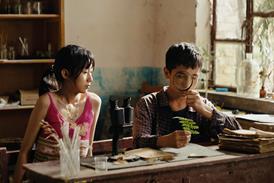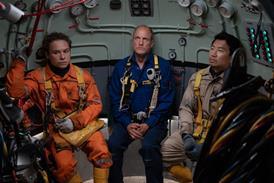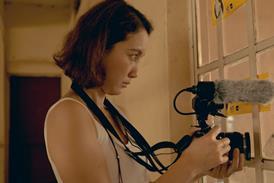Dir: Takashi Miike. Japan. 2003. 112mins.
Kuroi Kazuo, executive producer of You've Got A Call and president of Kadokawa-Daiei, insists that this shocker, about death-messaging mobile phones, is not yet another reworking of Ringu, the Hideo Nakata film that launched the Japanese horror boom back in 1998. "We're doing a different take - more modern and high tech," he told Screen International. Granted, a mobile is more modern and high tech than the ghostly videotape in Ringu - but the real difference between You've Got A Call and its predecessor is director Takashi Miike.
Many of Miike's 50-plus films have horror elements. He has even made a horror musical, The Happiness Of The Katakuris, complete with dancing and singing corpses. You've Got A Call, however, is his first outright horror film, made for between $1m and $2m, far more than his usual direct-to-video budget.
At home, distributor Toho is positioning You've Got A Call as multiplex entertainment. The popularity of star Ko Shibasaki is the biggest reason for this: Miike's Japanese fanbase is not large enough to justify a wide release on the basis of his name alone. Nor is the film likely to generate the cult following of last year's horror hit The Grudge, although it is more accessible than the outrages Miike has become known for in the West. With no genre competition against You've Got A Call when it opens in Japan on January 17, box office should be sufficient to keep backers happy.
Overseas, the international notoriety of director Miike will not hurt, although for long stretches the film is standard commercial horror, with few of his distinctive touches. Foreign fans prefer him in his more extreme, hyper-violent moods - which in You've Got A Call he enters only in the final act.
Based on a novel by Yasushi Akimoto, You've Got A Call has many of the standard tropes of the Japanese horror genre: ordinary girls as victims, the use of everyday technology as a conduit for evil and a protagonist who, though ordinary enough herself, becomes determined to solve the deadly mystery.
For the first hour or so, Miike's combination of those elements evidences little in the way of a distinctive style. Then, when the scene shifts to an abandoned hospital and evil comes out of its closet (or rather oozes out of its vat), the audience are suddenly in Miike World, where the dead are not only conventionally implacable but scarifyingly plastic. Rationality take a holiday as Miike indulges his love of the grotesque - and sudden twists that send the film hurling into a new surrealistic universe. For Miike fans, all this will be familiar. For those expecting a generic horror flick, Miike's imagination may be too out-there for comfort - or comprehension.
Ko Shibasaki stars as Yumi, a college student whose friends start dying in mysterious circumstances. First, the victim gets a voice message on her mobile. The call is from her own phone, dated three days in the future. She listens to it - and hears herself screaming. Three days later, she meets a horrifying end.
When the body count reaches two, Yumi meets Hiroshi (Shinichi Tsutsumi), a funeral parlour operator whose sister has died in the same mysterious way. Together they try to break this chain call of death - but not in time to save a third victim. Soon after, Yumi gets a voice message.
Since a breakout performances in Isao Yukisada's hit 2001 drama Go, Ko Shibasaki has emerged as one of the hottest young actresses in Japan. In You've Got A Call she shows why, delivering a solid performance that makes the bizarre goings-on emotionally credible, if hardly logical. While letting loose with the obligatory screams, she remains intensely focused on the task at hand: making the madness stop.
Someday Miike may deliver a complete film as maniacally gripping as the last 30 minutes of You've Got A Call. In the meantime, he's given cinema audiences a plausible new setting for horror. An old hospital ward is as likely a place for angry ghosts as any - especially after they've gotten the bill.
Production cos: Kadokawa-Daiei, Nippon Television Network, Dentsu, SDP
International sales: Kadokawa-Daiei
Japan distribution: Toho
Executive producer: Kazuo Kuroi
Producer: Naoki Sato, Yoichi Arishige, Fumio Inoue
Screenplay: Minako Oryo
Cinematographer: Hideo Yamamoto
Music: Koji Endo
Production design: Nao Inagaki
Main cast: Ko Shibasaki, Shinichi Tsutsumi, Kazu Fukuishi, Goro Kishitani, Renji Ishibashi



















No comments yet